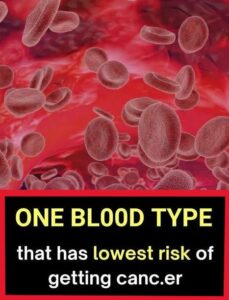Doctors Identify the Blood Type Least Likely to Develop Cancer

Your blood type may reveal more about your health than you think. While it’s most often discussed during emergencies or transfusions, new research suggests it could also play a surprising role in your long-term cancer risk.
According to a 2015 study, individuals with Type O blood appear to have the lowest likelihood of developing several major cancers — particularly those affecting the stomach, pancreas, and colon. Meanwhile, people with blood types A, B, or AB showed a greater tendency toward these cancers, especially stomach and pancreatic forms.
Scientists believe that certain antigens found in A, B, and AB blood types might influence how cancer cells grow or interact with the body’s immune system. Type O blood, lacking these specific antigens, may provide a small protective advantage.
Interestingly, the benefits of Type O don’t stop there. Previous studies have also linked it to a reduced risk of heart disease, possibly because this blood group tends to have lower levels of clotting factors.
However, doctors emphasize that blood type alone doesn’t determine cancer outcomes. While it may slightly alter your risk of developing the disease, it does not affect survival or mortality rates.
Each person’s blood type — A, B, AB, or O, positive or negative — is defined by unique proteins on the surface of red blood cells, including the Rh factor. Most people only learn their type during hospital visits, pregnancy, or donation drives.
Health experts caution that lifestyle, genetics, diet, and environment still play far greater roles in cancer prevention than blood type. Knowing your type may offer interesting insight — but it’s no substitute for regular screenings, balanced nutrition, and avoiding risk factors like smoking or excessive alcohol.